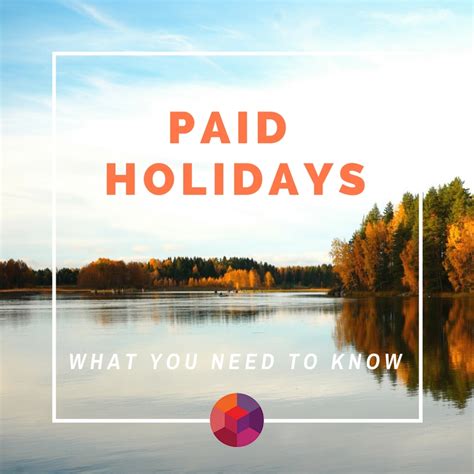Demystifying Paid Holidays: All You Need To Know

As an employee or an employer, paid holidays are an important aspect of employment. Paid holidays are days off work that are paid for by the employer. They are a way for employees to rest, recharge, and spend time with family and friends. For employers, paid holidays are a way to attract and retain top talent and to show appreciation for their hard work. In this post, we will demystify paid holidays and cover everything you need to know.
What are Paid Holidays?
Paid holidays are days off work that are paid for by the employer. They are typically given to employees on specific days of the year, such as national holidays or religious observances. Paid holidays are a way for employers to show appreciation for their employees and to give them time off to rest and recharge.
Types of Paid Holidays
There are different types of paid holidays that employers may offer. These include:
- National holidays
- Religious holidays
- Personal days
- Vacation days
- Sick days
- Bereavement days
How are Paid Holidays Calculated?
Paid holidays are typically calculated based on the employee’s regular rate of pay. This means that if an employee works on a paid holiday, they will receive their regular rate of pay plus any additional pay or benefits that may be offered by the employer.
Who is Eligible for Paid Holidays?
Eligibility for paid holidays may vary depending on the employer’s policies and the employee’s status. In general, full-time employees are more likely to be eligible for paid holidays than part-time employees or contractors. Some employers may also require a certain amount of time worked or tenure before an employee is eligible for paid holidays.
What if You Have to Work on a Paid Holiday?
If an employee is required to work on a paid holiday, they may be entitled to additional pay or benefits. This may include overtime pay, premium pay, or additional time off. Employers should have clear policies in place regarding paid holidays and how they are handled when employees are required to work.
How to Request Paid Holidays
Employees may be required to request paid holidays in advance, depending on their employer’s policies. This may involve filling out a request form or submitting a request through an online system. It is important for employees to be familiar with their employer’s policies regarding paid holidays and to follow the proper procedures for requesting time off.
What Happens to Unused Paid Holidays?
Unused paid holidays may be carried over to the next year, depending on the employer’s policies. Some employers may have a “use it or lose it” policy, which means that unused paid holidays are forfeited at the end of the year. It is important for employees to be aware of their employer’s policies regarding unused paid holidays.
Conclusion
Paid holidays are an important aspect of employment that benefit both employees and employers. By understanding how paid holidays work, employees can make the most of their time off and employers can attract and retain top talent. It is important for both employees and employers to be familiar with their policies regarding paid holidays and to follow proper procedures for requesting and handling time off.
Frequently Asked Questions
What are paid holidays?
Paid holidays are days off work that are paid for by the employer. They are typically given to employees on specific days of the year, such as national holidays or religious observances.
Who is eligible for paid holidays?
Eligibility for paid holidays may vary depending on the employer’s policies and the employee’s status. In general, full-time employees are more likely to be eligible for paid holidays than part-time employees or contractors. Some employers may also require a certain amount of time worked or tenure before an employee is eligible for paid holidays.
What happens to unused paid holidays?
Unused paid holidays may be carried over to the next year, depending on the employer’s policies. Some employers may have a “use it or lose it” policy, which means that unused paid holidays are forfeited at the end of the year.
What if I have to work on a paid holiday?
If an employee is required to work on a paid holiday, they may be entitled to additional pay or benefits. This may include overtime pay, premium pay, or additional time off. Employers should have clear policies in place regarding paid holidays and how they are handled when employees are required to work.
